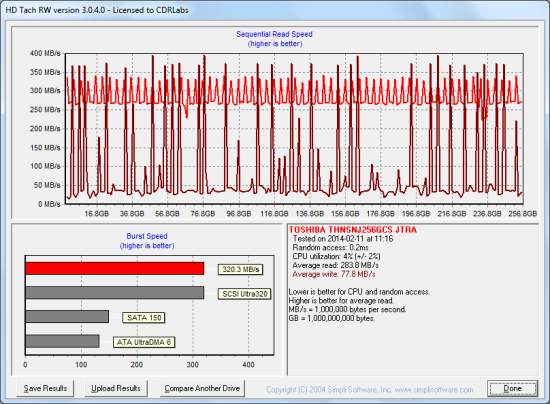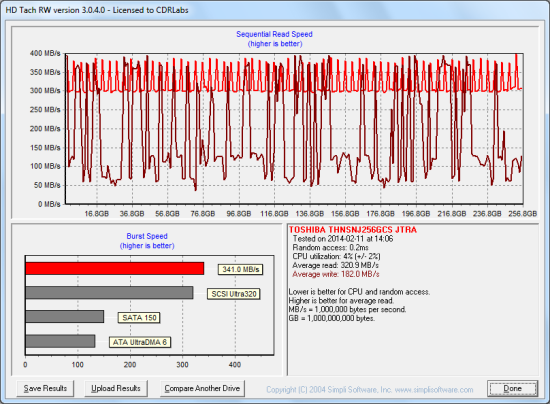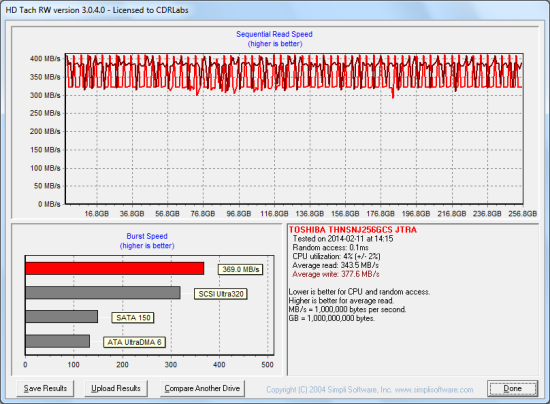TRIM Performance:
While SSD's offer many benefits, there are some downsides to using flash memory. One of the biggest issues people run into is performance degradation. Over time, an SSD will run out of fresh blocks and will have to write over data the file system has marked as deleted. This procedure is very complicated and can slow an SSD's write speeds considerably.
To fix this problem, most manufacturers have added TRIM support to their SSDs. The TRIM command allows an operating system, such as Windows 7, to tell an SSD which data blocks are no longer in use. Using this information, the drive pro-actively erases these blocks and adds them to the free block pool.

To test the Q Series Pro's TRIM function, I first put the drive in a "dirty" state. I used Iometer to fill the entire drive and then ran a random write test for 30 minutes. Looking at the screenshot below, you can see that the Q Series Pro's average read and write speeds dropped to 283.8 MB/s and 77.8 MB/s, respectively.

Toshiba Q Series Pro 256GB - Dirty
To see how well the Q Series Pro could recover, I let the computer sit for about two and a half hours and then reran the test. The drive wasn't able to reach the factory fresh performance shown in our earlier tests. However, its average write speed climbed up to 182.0 MB/s.

Toshiba Q Series Pro 256GB - After TRIM
Lastly, I used Parted Magic to perform a secure erase on the Q Series Pro. With the drive wiped clean, it had average read and write speeds of 343.5 MB/s and 377.6 MB/s, respectively.

Toshiba Q Series Pro 256GB - Secure Erase
Final Thoughts:
While not the fastest or most feature packed SSD to come through the 'Labs, Toshiba's Q Series Pro delivers a lot of bang for your buck. This ultra-slim drive combines Toshiba's TC358790XBG controller with their own 19nm Toggle mode MLC NAND flash to deliver a fast and responsive computing experience. In our sequential read and write tests, the Q Series Pro was able to read at speeds as high as 554 MB/s and write at speeds in excess of 490 MB/s. Despite the lack of a separate DRAM cache, it also did better than expected in our random write tests, producing more than 57,000 IOPS at low queue depths. Given, these numbers aren't nearly as high as what we saw with Samsung's 840 EVO series SSDs. However, the Q Series Pro is still a huge step up over traditional hard drives and an ideal for those on a budget, looking to upgrade an older desktop or notebook computer.
Toshiba's Q Series Pro SSD is available now in 128GB, 256GB and 512GB capacities. Prices on Amazon.com currently range from $87 up to $355, with the 256GB version reviewed here going for about $154.

Highs:
- Available in 128GB, 256GB and 512GB capacities
- Excellent sequential read and write speeds
- Performs equally well with compressible and incompressible data
- SATA 6Gb/s interface
- Toggle Mode NAND flash
- Supports SMART and TRIM
- Ultra-slim form factor
- Includes NTI Echo data migration software
- Includes mounting spacer for 9.5mm applications
- Reasonably priced
- 3 year warranty
Lows:
- Mediocre random read and write performance
- Does not support hardware based encryption

